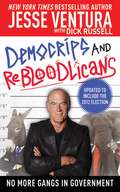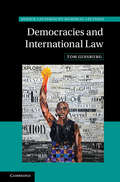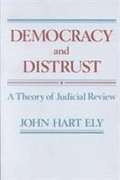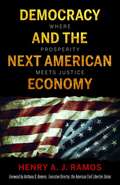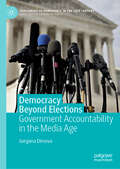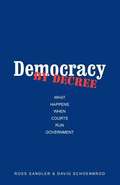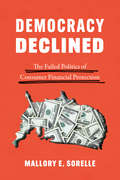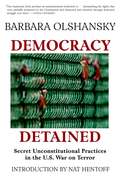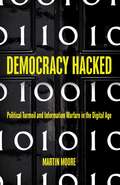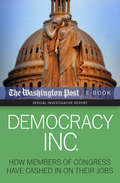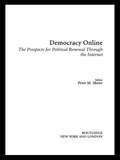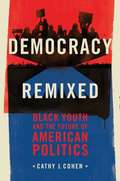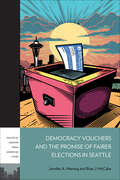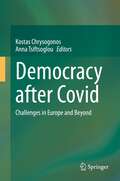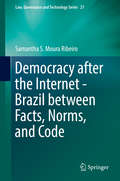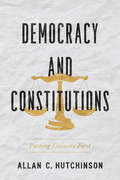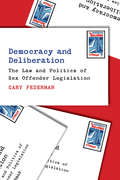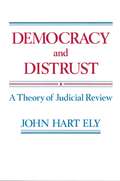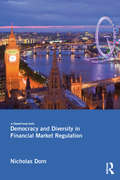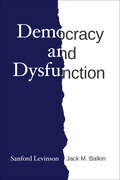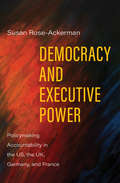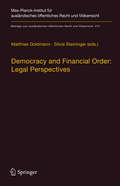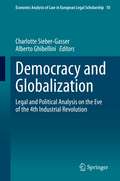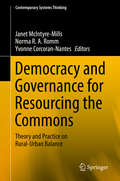- Table View
- List View
DemoCRIPS and ReBLOODlicans: No More Gangs in Government
by Jesse Ventura Dick RussellDemoCRIPS and ReBLOODlicans uncovers the truth about how corporations have bought the American electoral and legislative process through the power of lobbyists, campaign contributions and political action committees. Covering historical details such as the development of the two-party system and the advent of third-party candidates throughout US history, DemoCRIPS and ReBLOODlicans exposes how the two-major parties, acting like a gang-land cabal, have allowed corporations, businesses and politically-motivated wealthy individuals to manipulate elections, bribe elected officials and, in short, silence the average American voter.Exposing the ineptitude of both parties at insuring the integrity and vitality of American democracy, Jesse Ventura advocates the replacement of the two-party system for a no party system based on the ideals of our Founding Fathers. As election time rolls around, this is most certainly the book that should be looked at for reforming our electorate system. The knowledge and research that have gone into DemoCRIPS and ReBLOODlicans is unmatched, and if there was to be change, this is most certainly where it should start!
Democracies and International Law (Hersch Lauterpacht Memorial Lectures)
by Tom GinsburgDemocracies and authoritarian regimes have different approaches to international law, grounded in their different forms of government. As the balance of power between democracies and non-democracies shifts, it will have consequences for international legal order. Human rights may face severe challenges in years ahead, but citizens of democratic countries may still benefit from international legal cooperation in other areas. Ranging across several continents, this volume surveys the state of democracy-enhancing international law, and provides ideas for a way forward in the face of rising authoritarianism.
Democracy And Distrust: A Theory Of Judicial Review
by John ElyThis powerfully argued appraisal of judicial review may change the face of American law. Written for layman and scholar alike, the book addresses one of the most important issues facing Americans today: within what guidelines shall the Supreme Court apply the strictures of the Constitution to the complexities of modern life? Until now legal experts have proposed two basic approaches to the Constitution. The first, "interpretivism," maintains that we should stick as closely as possible to what is explicit in the document itself. The second, predominant in recent academic theorizing, argues that the courts should be guided by what they see as the fundamental values of American society. John Hart Ely demonstrates that both of these approaches are inherently incomplete and inadequate. Democracy and Distrust sets forth a new and persuasive basis for determining the role of the Supreme Court today. Ely's proposal is centered on the view that the Court should devote itself to assuring majority governance while protecting minority rights. "The Constitution," he writes, "has proceeded from the sensible assumption that an effective majority will not unreasonably threaten its own rights, and has sought to assure that such a majority not systematically treat others less well than it treats itself. It has done so by structuring decision processes at all levels in an attempt to ensure, first, that everyone's interests will be represented when decisions are made, and second, that the application of those decisions will not be manipulated so as to reintroduce in practice the sort of discrimination that is impermissible in theory." Thus, Ely's emphasis is on the procedural side of due process, on the preservation of governmental structure rather than on the recognition of elusive social values. At the same time, his approach is free of interpretivism's rigidity because it is fully responsive to the changing wishes of a popular majority. Consequently, his book will have a profound impact on legal opinion at all levels--from experts in constitutional law, to lawyers with general practices, to concerned citizens watching the bewildering changes in American law.
Democracy And The Next American Economy: Where Prosperity Meets Justice
by Henry A. J. RamosProgressive intellectual Henry A. J. Ramos believes the United States is at a crossroads, facing the most challenging moment since the civil rights movement of the late 1960s and early 1970s. In fact, absent major new interventions and investments, he sees this moment as a pivotal turning point in the American journey in which political polarization, income and wealth disparity and public violence"€"much of which is race related"€"threaten the very essence and integrity of our democracy and economy. Ramos examines the policies that have contributed to America's decline, including those that have led to the concentration of great wealth in the hands of a few while condemning many to systemic poverty and inequality. Current economic and social trends, he stresses, are unsustainable and call for organized, concerted action by people of conscience and those affected. <P><P> Ultimately, Ramos provides a roadmap for the future so the United States can continue to provide opportunities for its people and serve again as a leader in the international community. He offers case studies of organizations that have successfully created and administered programs that further equity in society, restore democratic practices, implement better urban and city planning and protect the environment. <P><P> Demonstrating both the critical importance and real possibility of leveraging prosperity and justice for all Americans, this compelling work is a must-read for anyone interested in democracy, economic restoration and environmental sustainability.
Democracy Beyond Elections: Government Accountability in the Media Age (Challenges to Democracy in the 21st Century)
by Gergana DimovaThis book provides the analytical framework for understanding the relationship between media scandals, executive accountability and the crisis of democracy. The empirical findings are based on an original database of 6000 media allegations and investigations in Russia, Germany and Bulgaria. Observations gained from the case studies are then placed in relation to a systematic analysis and critique of more than 100 models of the transformation and crisis of democracy. The book will be of particular interest to researchers focusing on democratic theory and political thought, as well as those working empirically in the field of democratic systems.
Democracy By Decree: What Happens When Courts Run Government
by Ross Sandler David SchoenbrodThis valuable book explains why schools, welfare agencies, and other important state and local institutions have come to be controlled by attorneys and judges rather than by governors and mayors. The authors discuss why this has resulted in worse service to the public and what can be done to restore control of these programs to elected—and accountable—officials.
Democracy Declined: The Failed Politics of Consumer Financial Protection (Chicago Studies in American Politics)
by Mallory E. SoRelleAs Elizabeth Warren memorably wrote, “It is impossible to buy a toaster that has a one-in-five chance of bursting into flames and burning down your house. But it is possible to refinance an existing home with a mortgage that has the same one-in-five chance of putting the family out on the street.” More than a century after the government embraced credit to fuel the American economy, consumer financial protections in the increasingly complex financial system still place the onus on individuals to sift through fine print for assurance that they are not vulnerable to predatory lending and other pitfalls of consumer financing and growing debt. In Democracy Declined, Mallory E. SoRelle argues that the failure of federal policy makers to curb risky practices can be explained by the evolution of consumer finance policies aimed at encouraging easy credit in part by foregoing more stringent regulation. Furthermore, SoRelle explains how angry borrowers’ experiences with these policies teach them to focus their attention primarily on banks and lenders instead of demanding that lawmakers address predatory behavior. As a result, advocacy groups have been mostly unsuccessful in mobilizing borrowers in support of stronger consumer financial protections. The absence of safeguards on consumer financing is particularly dangerous because the consequences extend well beyond harm to individuals—they threaten the stability of entire economies. SoRelle identifies pathways to mitigate these potentially disastrous consequences through greater public participation.
Democracy Detained: Military Tribunals and the Threat to Democracy
by Barbara Olshansky Nat HentoffDemocracy Detained exposes the deplorable secret crimes committed by the Bush administration in their war on terror. Prominent legal activist Barbara Olshansky documents the assault on our constitutional democracy since 9/11, meticulously analyzing the unlawful justifications made by the U.S. government for covert actions at home and abroad. She reports on current shocking practices, from the outsourcing of torture through extraordinary rendition, to first-person testimony from innocent men imprisoned without charge at Guantánamo Bay, to revelations of a surveillance network tapped into the homes of average citizens. Democracy Detained is an essential resource for Americans concerned about their civil rights.
Democracy Hacked: How Technology is Destabilising Global Politics
by Martin MooreTechnology has fractured democracy, and now there&’s no going back. All around the world, the fringes have stormed the palace of the elites and unleashed data miners, dark ads and bots on an unwitting public. After years of soundbites about connecting people, the social media giants are only just beginning to admit to the scale of the problem. We stand on the precipice of an era where switching your mobile platform will have more impact on your life than switching your government. Where freedom and privacy are seen as incompatible with social well-being and transparency. Where your attention is sold to the highest bidder. Our laws don&’t cover what is happening and our politicians don&’t understand it. But if we don&’t fight to change the system now, we may not get another chance.
Democracy Inc.: How Members of Congress Have Cashed In On Their Jobs (Special Investigative Report)
by Scott Higham The Washington Post David S. Fallis Dan Keating Kimberly KindyAn investigation into how legislators have taken advantage of their positions—and of weak financial disclosure laws—to make millions. After a historic financial crisis led Congress to unprecedented economic intervention, the Pulitzer Prize-winning Washington Post began an investigation that pierced the secrecy of the deeply flawed financial disclosure system that governs the 535 men and women who draft the nation&’s laws. Members of Congress directed millions of dollars to infrastructure projects near their residences and businesses, in some cases paving roads in front of their houses. They made major trades in the stocks of companies pressing them for legislation. They wrote laws favoring industries in which they were invested. They sponsored bills on which their own family members were paid to lobby. All of it is legal under the rules Congress has written for itself. Democracy Inc. shows the consequences of this system.
Democracy Online: The Prospects for Political Renewal Through the Internet
by Peter M. ShaneTaking a multidisciplinary approach that they identify as a "cyber-realist research agenda," the contributors to this volume examine the prospects for electronic democracy in terms of its form and practice--while avoiding the pitfall of treating the benefits of electronic democracy as being self-evident. The debates question what electronic democracy needs to accomplish in order to revitalize democracy and what the current state of electronic democracy can teach us about the challenges and opportunities for implementing democratic technology initiatives.
Democracy Remixed
by Cathy J. CohenIn Democracy Remixed, award-winning scholar Cathy J. Cohen offers an authoritative and empirically powerful analysis of the state of black youth in America today. Utilizing the results from the Black Youth Project, a groundbreaking nationwide survey, Cohen focuses on what young Black Americans actually experience and think--and underscores the political repercussions. Featuring stories from cities across the country, she reveals that black youth want, in large part, what most Americans want--a good job, a fulfilling life, safety, respect, and equality. But while this generation has much in common with the rest of America, they also believe that equality does not yet exist, at least not in their lives. Many believe that they are treated as second-class citizens. Moreover, for many the future seems bleak when they look at their neighborhoods, their schools, and even their own lives and choices. Through their words, these young people provide a complex and balanced picture of the intersection of opportunity and discrimination in their lives. Democracy Remixed provides the insight we need to transform the future of young Black Americans and American democracy.
Democracy Vouchers and the Promise of Fairer Elections in Seattle (PLAC: Political Lessons from American Cities)
by Brian J. McCabe Jennifer A. HeerwigIn 2017, Seattle inaugurated a new way for citizens to be involved in democracy: they introduced publicly financed vouchers for voters to donate to local candidates. The innovative plan is designed to level the playing field in campaign financing. Through the vouchers, residents allocate dollars to candidates of their choice in local elections, putting political money directly in the hands of voters. The intent is to increase political participation and ameliorate the long-standing representational inequalities of private donations. Democracy Vouchers and the Promise of Fairer Elections in Seattle critically evaluates the success and impact of this program. Jennifer Heerwig and Brian J. McCabe emphasize how local elections now attract a much wider and more diverse field of both donors and candidates. They also consider external threats to the program, from litigation about the constitutionality of a voucher program to the rise of independent expenditures. Offering important lessons on how other cities can adopt a similar program, this compelling case study also highlights the obstacles that will likely arise in its implementation.
Democracy after Covid: Challenges in Europe and Beyond
by Kostas Chrysogonos Anna TsiftsoglouThis book, one of the first of its kind, explores the impact of the COVID-19 pandemic on modern Western democracies from a comparative constitutional law and policy perspective. Through 11 scholarly contributions, it tackles cutting-edge topics for the liberal state, such as emergency legislation, judicial scrutiny of COVID-19 measures, parliamentarism and executive decision-making during the pandemic. The book examines these topics both from a microscopic national constitutional angle, with a focus on European states, and from a macroscopic regional and comparative angle, on par with the American example. The COVID-19 pandemic is thus treated as an international state of emergency that has enabled far-reaching restrictions on essential human rights, such as freedom of movement, freedom of religion or even major political rights, while giving rise to the ‘administrative state.’This edited volume explores each of these pressing themes in this exceptional context and evaluates different liberal states’ responses to the pandemic. Were these responses reasonable, effective and democratic? Or is the COVID-19 pandemic just the beginning of a new era of global democratic backsliding? How can liberal democracies manage similar crises in future? What lessons have we learned? The institutional knowledge gained turns out to be the key for the future of the rule of law.
Democracy after the Internet - Brazil between Facts, Norms, and Code
by Samantha S. Moura RibeiroThis book throws new light on the way in which the Internet impacts on democracy. Based on Jürgen Habermas' discourse-theoretical reconstruction of democracy, it examines one of the world's largest, most diverse but also most unequal democracies, Brazil, in terms of the broad social and legal effects the internet has had. Focusing on the Brazilian constitutional evolution, the book examines how the Internet might impact on the legitimacy of a democratic order and if, and how, it might yield opportunities for democratic empowerment. The book also assesses the ways in which law, as an institution and a system, reacts to the changes and challenges brought about by the Internet: the ways in which law may retain its strength as an integrative force, avoiding a 'virtual' legitimacy crisis.
Democracy and Constitutions: Putting Citizens First (UTP Insights)
by Allan HutchinsonAs things stand, a commitment to weak democracy and strong constitutionalism ensures that a range of elite groups, actors, and institutions – political, economic, intellectual, and legal – hold considerable sway over constitutional matters, leaving less room for the participation of ordinary people. With the continued primacy of liberal constitutionalism, constitutional law has come to represent and facilitate the centrality of judicial power and authority. In Democracy and Constitutions, Allan C. Hutchinson warns against this deference to a legal elite on questions of constitutional meaning. For Hutchinson, an over-reliance on constitutional law, and a lack of attention to democratic politics, keeps people from influencing the moral and political character of society; it saps civic energies and relegates ordinary people to the sidelines. Engaging and provocative, Democracy and Constitutions charts a course away from the elitism of the present and toward a more democratic future, one that re-balances society’s commitment to both democracy and constitutions. Advocating for a strong democracy and weak constitutionalism, this book places ordinary people at the institutional heart of government and politics, arguing that such a re-calibration is better for democracy and for society.
Democracy and Deliberation: The Law and Politics of Sex Offender Legislation
by Cary FedermanSex offender laws include residency restrictions, registration and notification requirements, and post-conviction civil commitment. These laws and regulations impose serious restrictions on the movements of convicted sex offenders. This is controversial because these laws and regulations occur after the sex offender has completed his time in prison. These laws and regulations are intended to have both a deterrent and therapeutic effect. Residency restrictions seek to prevent sex offenders from recommitting their crimes and civil commitment provides psychological services while incarcerated in a forensic facility. Most works on this subject are deeply critical of these laws. Cary Federman takes a more sympathetic approach to sex offender legislation. He focuses on the deliberative intentions of legislators, exploring the limits of judicial review and the rights of interested parties to influence lawmaking. Leaders of these interested parties are usually the parents of children who have been sexually violated and murdered. Critics of sex offender legislation tend to focus on the convicted parties, arguing that their rights have been violated. Democracy and Deliberation asserts that these laws are expressions of the deliberative intentions of lawmakers concerned about public safety—they are thus constitutional, if not always wise.
Democracy and Distrust: A Theory of Judicial Review
by John Hart ElyThis powerfully argued appraisal of judicial review may change the face of American law. Written for layman and scholar alike, the book addresses one of the most important issues facing Americans today: within what guidelines shall the Supreme Court apply the strictures of the Constitution to the complexities of modern life? Until now legal experts have proposed two basic approaches to the Constitution. The first, "interpretivism," maintains that we should stick as closely as possible to what is explicit in the document itself. The second, predominant in recent academic theorizing, argues that the courts should be guided by what they see as the fundamental values of American society. John Hart Ely demonstrates that both of these approaches are inherently incomplete and inadequate. Democracy and Distrust sets forth a new and persuasive basis for determining the role of the Supreme Court today.
Democracy and Distrust: A Theory of Judicial Review
by John Hart ElyThis powerfully argued appraisal of judicial review may change the face of American law. Written for layman and scholar alike, the book addresses one of the most important issues facing Americans today: within what guidelines shall the Supreme Court apply the strictures of the Constitution to the complexities of modern life? Until now legal experts have proposed two basic approaches to the Constitution. The first, “interpretivism,” maintains that we should stick as closely as possible to what is explicit in the document itself. The second, predominant in recent academic theorizing, argues that the courts should be guided by what they see as the fundamental values of American society. John Hart Ely demonstrates that both of these approaches are inherently incomplete and inadequate. Democracy and Distrust sets forth a new and persuasive basis for determining the role of the Supreme Court today. Ely’s proposal is centered on the view that the Court should devote itself to assuring majority governance while protecting minority rights. “The Constitution,” he writes, “has proceeded from the sensible assumption that an effective majority will not unreasonably threaten its own rights, and has sought to assure that such a majority not systematically treat others less well than it treats itself. It has done so by structuring decision processes at all levels in an attempt to ensure, first, that everyone’s interests will be represented when decisions are made, and second, that the application of those decisions will not be manipulated so as to reintroduce in practice the sort of discrimination that is impermissible in theory.” Thus, Ely’s emphasis is on the procedural side of due process, on the preservation of governmental structure rather than on the recognition of elusive social values. At the same time, his approach is free of interpretivism’s rigidity because it is fully responsive to the changing wishes of a popular majority. Consequently, his book will have a profound impact on legal opinion at all levels—from experts in constitutional law, to lawyers with general practices, to concerned citizens watching the bewildering changes in American law.
Democracy and Diversity in Financial Market Regulation
by Nicholas DornFinancial markets have become acknowledged as a source of crisis, and discussion of them has shifted from economics, through legal and regulatory studies, to politics. Events from 2008 onwards raise important, cross-disciplinary questions: must financial markets drive states into political and existential crisis, must public finances take over private losses, must citizens endure austerity? This book argues that there is an alternative. If the financial system were less 'connected', contagion within the market would be reduced and crises would become more localised and intermittent, less global and pervasive. The question then becomes how to reduce connectedness within financial markets. This book argues that the democratic direction of financial market policies can deliver this. Politicising financial market policies – taking discussion of these issues out of the sphere of the 'technical' and putting it into the same democratically contested space as, for example, health and welfare policies – would encourage differing policies to emerge in different countries. Diversity of regulatory regimes would result in some business models being attracted to some jurisdictions, others to others. The resulting heterogeneity, when viewed from a global perspective, would be a reversal of recent and current tendencies towards one single/global 'level playing field', within which all financial firms and sectors have become closely connected and across which contagion inevitably reigns. No doubt the democratisation of financial market policy would be opposed by big firms – their interests being served by regulatory convergence – and considered macabre by some financial regulators and central bankers, who are coalescing into an elite community. However, everyone else, Nicholas Dorn argues here, would be better off in a financial world characterised by greater diversity.
Democracy and Dysfunction
by Sanford Levinson Jack M. BalkinIt is no longer controversial that the American political system has become deeply dysfunctional. Today, only slightly more than a quarter of Americans believe the country is heading in the right direction, while sixty-three percent believe we are on a downward slope. The top twenty words used to describe the past year include “chaotic,” “turbulent,” and “disastrous.” Donald Trump’s improbable rise to power and his 2016 Electoral College victory placed America’s political dysfunction in an especially troubling light, but given the extreme polarization of contemporary politics, the outlook would have been grim even if Hillary Clinton had won. The greatest upset in American presidential history is only a symptom of deeper problems of political culture and constitutional design. Democracy and Dysfunction brings together two of the leading constitutional law scholars of our time, Sanford Levinson and Jack M. Balkin, in an urgently needed conversation that seeks to uncover the underlying causes of our current crisis and their meaning for American democracy. In a series of letters exchanged over a period of two years, Levinson and Balkin travel—along with the rest of the country—through the convulsions of the 2016 election and Trump’s first year in office. They disagree about the scope of the crisis and the remedy required. Levinson believes that our Constitution is fundamentally defective and argues for a new constitutional convention, while Balkin, who believes we are suffering from constitutional rot, argues that there are less radical solutions. As it becomes dangerously clear that Americans—and the world—will be living with the consequences of this pivotal period for many years to come, it is imperative that we understand how we got here—and how we might forestall the next demagogue who will seek to beguile the American public.
Democracy and Executive Power: Policymaking Accountability in the US, the UK, Germany, and France
by Susan Rose-AckermanA defense of regulatory agencies&’ efforts to combine public consultation with bureaucratic expertise to serve the interest of all citizens The statutory delegation of rule-making authority to the executive has recently become a source of controversy. There are guiding models, but none, Susan Rose-Ackerman claims, is a good fit with the needs of regulating in the public interest. Using a cross-national comparison of public policy-making in the United States, the United Kingdom, France, and Germany, she argues that public participation inside executive rule-making processes is necessary to preserve the legitimacy of regulatory policy-making.
Democracy and Financial Order: Legal Perspectives (Beiträge zum ausländischen öffentlichen Recht und Völkerrecht #273)
by Matthias Goldmann Silvia SteiningerThis book discusses the relationship between democracy and the financial order from various legal perspectives. Each of the nine contributions adopts a unique perspective on the legal and political challenges brought to the fore by the Global Financial Crisis. This crisis and the ensuing sovereign debt crisis in Europe are only the latest in a long series of financial crises around the globe in recent decades. By their very existence, but also as a result of the political turmoil they have created, these financial crises testify to the well-known tensions between democracy and a market-based economic and financial order. However, what is missing in this debate is an analysis of the role of law for reconciling democracy with a market-based financial order. To fill this lacuna, the book focuses on the controversy surrounding the concept of law, thereby adding another variable to the debate on the relation between democracy and capitalism. Each chapter addresses the concept of law from a particular theoretical angle, be it a full-grown legal theory or an approach in political economy that has a particular view of the law.
Democracy and Globalization: Legal and Political Analysis on the Eve of the 4th Industrial Revolution (Economic Analysis of Law in European Legal Scholarship #10)
by Charlotte Sieber-Gasser Alberto GhibelliniThis book offers in-depth legal and political analysis concerning the compatibility of the Westphalian state model with globalization and the digital revolution. It explores the concept of democracy in a globalized world, discusses the legitimacy of economic integration in the global market, and presents three case studies (from Brazil, Taiwan and Spain) on the impact of social media on elections. It further entails novel perspectives on the impact of digitalization on national borders, and the role of citizens and experts in the shaping of globalization. A final chapter addresses the extent to which insights gained from the analysis of the abovementioned aspects will need to be considered in efforts to recover from the current global health and economic crisis.
Democracy and Governance for Resourcing the Commons: Theory and Practice on Rural-Urban Balance (Contemporary Systems Thinking)
by Yvonne Corcoran-Nantes Norma R. A. Romm Janet McIntyre-MillsThis book promotes the well-being of the commons through representation and accountability through monitoring from below in order to operationalize engagement. This book views the commons as a legal concept, a transformative governance concept, and a basis for systemic ethics. The chapters focus on practical responses to address complex problems that comprise many interrelated variables and are perceived differently by stakeholders with different values and life experiences. By considering these different stakeholders, the goal is to highlight ways to regenerate and invigorate employment opportunities. The book identifies pathways towards ethical vocational education to enable lifelong engagement by active citizens which requires action learning to address areas of perceived policy concern. Throughout the chapters in this book, the authors discuss transformative research and its implications on stakeholders. They focus on re-presentation and its implications for thinking and practice. One author makes the case for fostering non anthropocentric approaches to ethical development. In addition, the chapters cover case studies including governance challenges associated with water management using a mixed method approach and also production of mushrooms in collaboration with coffee growers in Jakarta. The book focuses on ways to de-colonialise knowledge formation in public policy and makes the case for an alternative approach to governance and democracy that takes into account a range of local people’s perspectives.
